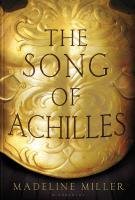Helpful Score: 3
I finished this book a few hours ago and I can't stop thinking about it. Its a gift the author has given us, perhaps a gift from the gods themselves.
TIME magazine said, Wildly romantic [and] surprisingly suspenseful....[B]ringing those dark figures back to life, making them men again, and while shes at it, us[ing] her passionate companion piece to The Iliad as a subtle swipe at todays ongoing debate over gay marriage. Talk about updating the classics. I couldn't agree more. I've read at least a dozen books in the past six weeks and this is by far the best. I don't usually read a book twice, but I will read this one again. The last chapter will stay with you for long time, if it doesn't make you weep then the gods/goddesses must not have given you a heart.
TIME magazine said, Wildly romantic [and] surprisingly suspenseful....[B]ringing those dark figures back to life, making them men again, and while shes at it, us[ing] her passionate companion piece to The Iliad as a subtle swipe at todays ongoing debate over gay marriage. Talk about updating the classics. I couldn't agree more. I've read at least a dozen books in the past six weeks and this is by far the best. I don't usually read a book twice, but I will read this one again. The last chapter will stay with you for long time, if it doesn't make you weep then the gods/goddesses must not have given you a heart.
Helpful Score: 2
I loved this book so much! I was completed caught up in the lives of Achilles and Patroclus. I could not put this book down and then I didn't want it to be over. I felt like I was inside the story. Madeline Miller is a master and I can not wait to read her next book.
Helpful Score: 1
Madeline Miller's âSong of Achillesâ flawlessly melds reality with myth, creating realistic mortal characters who spring to life off the page and in the same breath, presenting gods and goddesses who meddle thoughtlessly in the lives of those mortals and who, for the reader immersed in the story, are every bit as believable. Mortal and divine, all are there in full flesh -- loving and petty, arrogant and forgiving, sly and manipulative by turns.
Miller has focused on the love affair between Achilles and Patroclus, and it is wildly, operatically romantic as Achilles moves inevitably toward the fate planned for him since perhaps the moment of his conception. And that's the weakest point in the book. It's easy enough to believe that the young Patroclus, exiled from his father's court for a childish miscalculation, could be enthralled by the youthful Achilles. Miller draws a young hero who is kind, loving, and protective, and creates a deepening bond between the two boys that turns sexual as they mature. It's harder to believe that this same loving and generous golden youth is the angry, arrogant warrior willing to see his countrymen die by the hundreds on the plains of Troy while he withholds his support from the battle, all over an insult to his pride.
Miller sticks fairly close to the Homeric version of the Trojan War, and finds an interesting connection between Agamemnon's sacrifice of Iphigenia and Achilles' impulsive claim on Briseis which ultimately led to the deeper conflict between the two men. She also brings Achilles' sea nymph mother, Thetis, to chilling life.
Miller has focused on the love affair between Achilles and Patroclus, and it is wildly, operatically romantic as Achilles moves inevitably toward the fate planned for him since perhaps the moment of his conception. And that's the weakest point in the book. It's easy enough to believe that the young Patroclus, exiled from his father's court for a childish miscalculation, could be enthralled by the youthful Achilles. Miller draws a young hero who is kind, loving, and protective, and creates a deepening bond between the two boys that turns sexual as they mature. It's harder to believe that this same loving and generous golden youth is the angry, arrogant warrior willing to see his countrymen die by the hundreds on the plains of Troy while he withholds his support from the battle, all over an insult to his pride.
Miller sticks fairly close to the Homeric version of the Trojan War, and finds an interesting connection between Agamemnon's sacrifice of Iphigenia and Achilles' impulsive claim on Briseis which ultimately led to the deeper conflict between the two men. She also brings Achilles' sea nymph mother, Thetis, to chilling life.




